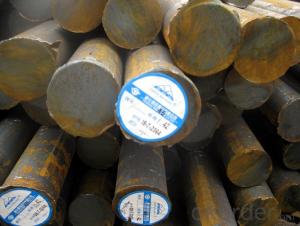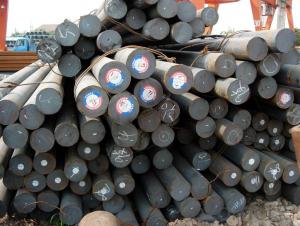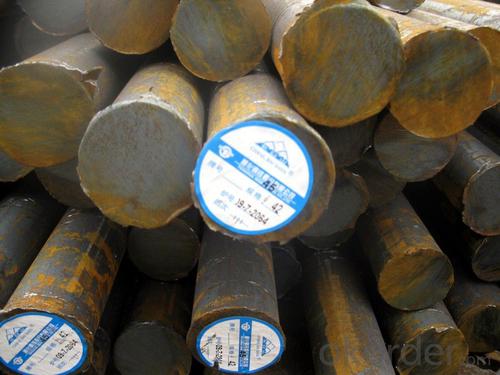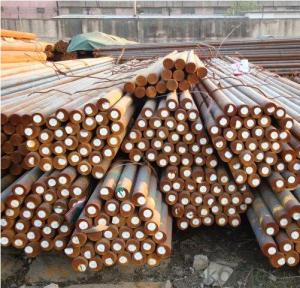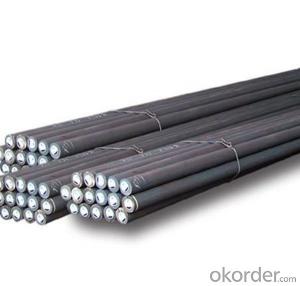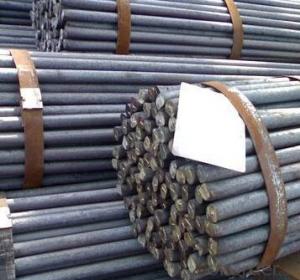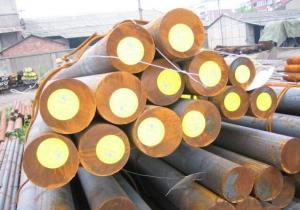Mould Steel Material DIN 1.2713/JIS SKT4/GB 5CrNiMo
- Loading Port:
- China main port
- Payment Terms:
- TT OR LC
- Min Order Qty:
- 25 m.t.
- Supply Capability:
- 10000 m.t./month
OKorder Service Pledge
OKorder Financial Service
You Might Also Like
Specification
The details of our Steel
1. Produce Standard: as the GB, AISI, ASTM, SAE, EN, BS, DIN, JIS Industry Standard
2. Produce processes: Smelt Iron -EAF smelt Billet - ESR smelt Billet -Hot rolled or forged get the steel round bar and plate
3. Heat treatment:
Normalized / Annealed / Quenched+Tempered
4. Quality assurance:
All order we can received Third party inspection, You can let SGS, BV,.. and others test company test and inspect our products before Goods shipping.
Product information
1.Specification of 1.2713 steel | |||||||||||||
Round bar | Diameter(mm) | Length (mm) | |||||||||||
50~500 | 2000~5800 | ||||||||||||
Plate | Thickness(mm) | Width (mm) | Length (mm) | ||||||||||
20~400 | 80~1000 | 2000~5800 | |||||||||||
The specification can be customised! | |||||||||||||
2.Chemical compositon of 1.2713 steel | |||||||||||||
NO. | C | Mn | Si | Cr | W | V | P | S | |||||
DIN1.2713 | 0.32~0.45 | 0.20~0.50 | 0.10~0.50 | 0.80~1.20 | -- | 0.80~1.20 | ≤0.030 | ≤0.030 | |||||
3.Delivery condition | |||||||||||||
Standard Number | Annealing | Heat treatment temp( °C ) | HRC Secondar Hardness | ||||||||||
1.2713/SKT4 | 760-780 | Hardening: 1020 Tempering: 530~560 | 54-59HRC | ||||||||||
4.Heat treatment | |||||||||||||
1. Initial preheating to 350-450°C; 2. Second preheating to 650-750°C; 3. Heat to hardening temperature 860-890°Cand hold at temperature; 4. Cooling in hot oil (40-60°C); oil quenched hardness: 54-59HRC; | |||||||||||||
1.EAF: Electric Furnace+LF+VD(Optional) | |||||||||||||
2.ESR: Electric Furnace+LF+VD+Eleroslag Remelted(Optional) | |||||||||||||
5.Application | |||||||||||||
(1) Be widely used in die-casting molds, hot extrusion dies which are for making aluminum castings, and perforation tools, mandrels, press forging dies and plastic dies and so on. | |||||||||||||
(2) Be used in structural parts which are making for aircrafts and rockets of withstanding 400-500°C working temperature. | |||||||||||||
6.Characteristic of H13 steel | |||||||||||||
(1) good strength and high abrasion resistance | |||||||||||||
(2) good quenching | |||||||||||||
Product show

Workshop show

- Q: What are the different oil and gas grades of special steel?
- There are several different oil and gas grades of special steel that are commonly used in the industry. These grades are specifically designed to withstand the harsh environments and high temperatures associated with oil and gas exploration and production. Some of the most commonly used grades include: 1. API 5CT: This grade is specifically designed for use in casing and tubing applications. It has high strength and excellent resistance to corrosion, making it ideal for use in demanding oil and gas environments. 2. API 5L: This grade is used for pipeline transportation systems in the petroleum and natural gas industries. It has excellent mechanical properties and is designed to withstand high pressure and temperature conditions. 3. NACE MR0175/ISO 15156: This grade is compliant with the NACE MR0175/ISO 15156 standard, which specifies the requirements for the use of metallic materials in oil and gas production environments containing H2S (sour service). These grades have high resistance to sulfide stress cracking and hydrogen-induced cracking. 4. Duplex Stainless Steel: This grade is used in applications where high strength, corrosion resistance, and resistance to stress corrosion cracking are required. It is commonly used in offshore oil and gas production, as well as in subsea equipment. 5. Super Duplex Stainless Steel: This grade offers even higher strength and corrosion resistance than duplex stainless steel. It is commonly used in demanding oil and gas applications, such as subsea and deepwater equipment. These are just a few examples of the different oil and gas grades of special steel available in the market. The selection of the appropriate grade depends on the specific application, operating conditions, and requirements of the project. It is crucial to consult with experts or refer to industry standards and specifications to ensure the right grade is chosen for a particular oil and gas project.
- Q: What are the main applications of special steel in the packaging machinery?
- Special steel is commonly used in packaging machinery for its high strength, durability, and resistance to wear and corrosion. It is primarily employed in the production of components such as blades, knives, rollers, and bearings, ensuring smooth and efficient packaging operations. Additionally, special steel's heat resistance and ability to maintain precision under extreme conditions make it suitable for applications involving high-speed packaging, cutting, and sealing processes.
- Q: How does special steel contribute to improving product aesthetics?
- Special steel can contribute to improving product aesthetics in several ways. Firstly, special steel can be manufactured with unique finishes and textures, enhancing the overall visual appeal of a product. This can include brushed, polished, or matte finishes, adding a touch of sophistication and elegance. Secondly, special steel can be shaped and formed into intricate and precise designs, allowing for the creation of visually appealing and intricate product components. Additionally, the strength and durability of special steel can enable products to have sleek and slim designs, reducing bulkiness and enhancing the overall aesthetics. Overall, special steel offers designers and manufacturers a versatile material that can enhance the visual appeal and aesthetic quality of their products.
- Q: How does special steel behave under different types of loading conditions?
- Special steel, also referred to as alloy steel, displays distinctive characteristics when subjected to different types of loads. It is specifically engineered to possess exceptional mechanical properties, rendering it suitable for a diverse range of applications where high strength, toughness, and resistance to wear or corrosion are necessary. Under tension loading, special steel demonstrates remarkable tensile strength and ductility, allowing it to endure pulling forces without easily fracturing. This property makes it ideal for applications where components are exposed to pulling or stretching forces, such as cables, structural elements, or automotive parts. When subjected to compressive loading, special steel showcases its exceptional ability to withstand forces that attempt to squeeze or press it together. This renders it suitable for applications like hydraulic cylinders, crankshafts, or flanges, where resistance to compression is essential. In terms of bending or flexural loading, special steel exhibits outstanding flexibility while retaining its strength, enabling it to endure repeated bending without deformation or failure. This property is particularly advantageous in applications involving springs, suspension systems, or beams exposed to dynamic loads. Special steel also possesses excellent fatigue resistance, which means it can endure cyclic loading or repeated stress without failure. This property is crucial in applications subjected to continuous or repetitive loading, such as turbine blades, gears, or axles. Furthermore, special steel effectively handles impact loading due to its high toughness and impact resistance. This makes it suitable for applications where sudden shocks or impacts are anticipated, such as hammer heads, drill bits, or armor plating. In terms of temperature loading, special steel retains its mechanical properties even at high temperatures due to its exceptional heat resistance. This property makes it suitable for applications exposed to extreme heat or thermal cycling, such as turbine components, exhaust systems, or molds utilized in metal casting. To summarize, special steel exhibits different behaviors under various loading conditions, adapting its mechanical properties to meet the specific requirements of each application. Its unique combination of strength, toughness, ductility, and resistance to wear or corrosion make it a versatile material capable of enduring different types of loading conditions.
- Q: What are the common defects found in special steel?
- The defects commonly found in special steel may vary depending on the specific type and manufacturing process employed. However, there are a few defects that tend to be prevalent across different types of special steel. One frequently encountered defect is the presence of surface imperfections, including cracks, pits, or scratches. These imperfections can occur during manufacturing or as a result of handling and transportation. Not only do surface imperfections affect the steel's aesthetic appeal, but they can also compromise its structural integrity. Another defect commonly observed is the existence of internal voids or inclusions. These are small pockets of gas or non-metallic materials trapped within the steel during casting or forging. Internal voids can weaken the steel and make it more susceptible to failure when subjected to stress. Inconsistent composition is also a defect that can arise in special steel. This occurs when the alloying elements are not evenly distributed throughout the steel. Such inconsistency can lead to variations in mechanical properties and render the steel less reliable and predictable in terms of performance. Grain structure defects are another common occurrence in special steel. These defects arise when the grains within the steel are improperly formed or are not uniform in size. Grain structure defects can negatively impact the steel's strength and toughness, thereby increasing its susceptibility to fracture or deformation. Lastly, improper heat treatment can give rise to defects in special steel. Since heat treatment is a crucial process in steel manufacturing, any errors in its execution can result in various defects, such as excessive hardness, brittleness, or poor dimensional stability. It is important to note that while these defects are commonly found, they can be minimized or eliminated through meticulous manufacturing processes, stringent quality control measures, and appropriate handling and storage of the steel.
- Q: Can special steel be used in aerospace turbine components?
- Yes, special steel can be used in aerospace turbine components. Special steel alloys, such as nickel-based superalloys, are commonly used in the manufacturing of turbine blades and other critical components in aerospace engines. These alloys possess high strength, excellent corrosion resistance, and can withstand extreme temperatures and stress conditions, making them suitable for the demanding environment of aerospace turbines.
- Q: How is special steel used in the production of molds and dies?
- Special steel is used in the production of molds and dies due to its exceptional durability, hardness, and resistance to wear and tear. This type of steel can withstand high temperatures and pressures, making it ideal for shaping and forming various materials. By using special steel, molds and dies can be manufactured with precision and reliability, ensuring the production of high-quality and accurate parts.
- Q: What are the different types of corrosion that special steel can encounter?
- Special steel has the potential to encounter a variety of corrosion types, including: 1. Uniform corrosion: This is the prevailing form of corrosion, where the steel's entire surface corrodes uniformly. It typically occurs when the steel is exposed to aggressive environments, such as corrosive chemicals or high levels of humidity. 2. Pitting corrosion: Pitting corrosion manifests as localized corrosion attack in the form of small pits or cavities on the steel's surface. It can arise from chloride ions or other aggressive substances and can be particularly damaging as it can lead to crack formation. 3. Crevice corrosion: Crevice corrosion arises within narrow gaps or crevices between steel surfaces, such as junctions, gaskets, or beneath deposits. It is caused by limited oxygen access and the accumulation of corrosive agents, resulting in localized corrosion and potential damage. 4. Galvanic corrosion: Galvanic corrosion arises when two dissimilar metals come into contact within an electrolyte. In special steel, this can occur when it comes into contact with another metal in a corrosive environment, resulting in accelerated corrosion of the less noble metal. 5. Stress corrosion cracking: This type of corrosion ensues due to the combined effects of tensile stress and a corrosive environment. It can cause the steel to crack and fail, even under relatively low stress levels. Special steel is often prone to stress corrosion cracking in specific environments, such as high chloride or acidic solutions. 6. Intergranular corrosion: Intergranular corrosion manifests along the grain boundaries of steel, typically due to the segregation of impurities during the steel's manufacturing process. It can weaken the material and lead to premature failure. To prevent or reduce the occurrence of these corrosion types, special steel can undergo treatment with various corrosion-resistant coatings, such as paints, metallic coatings, or alloys with high corrosion resistance. Moreover, proper material selection, design considerations, and regular maintenance can also aid in minimizing the risk of corrosion in special steel applications.
- Q: What are the different methods of hardening special steel?
- There are several different methods of hardening special steel, including heat treatment, quenching, tempering, and carburizing. Heat treatment involves heating the steel to a specific temperature and then cooling it rapidly to increase its hardness. Quenching involves rapidly cooling the heated steel in a liquid, such as oil or water, to achieve high hardness. Tempering is a process that follows quenching, where the steel is reheated to a lower temperature to reduce brittleness and increase toughness. Carburizing is a method where the steel is heated in a carbon-rich environment to increase its surface hardness by infusing carbon atoms into the outer layer. These methods can be used individually or in combination to achieve desired hardness levels in special steel.
- Q: What are the different corrosion-resistant special steel alloys?
- Some examples of corrosion-resistant special steel alloys include stainless steel, which contains chromium and nickel for improved resistance to corrosion; duplex stainless steel, which has a combination of austenite and ferrite structures for enhanced corrosion resistance; and super duplex stainless steel, which has even higher levels of chromium, molybdenum, and nitrogen for superior corrosion resistance in harsh environments. Other corrosion-resistant alloys may include nickel-based alloys, titanium alloys, and aluminum alloys.
Send your message to us
Mould Steel Material DIN 1.2713/JIS SKT4/GB 5CrNiMo
- Loading Port:
- China main port
- Payment Terms:
- TT OR LC
- Min Order Qty:
- 25 m.t.
- Supply Capability:
- 10000 m.t./month
OKorder Service Pledge
OKorder Financial Service
Similar products
Hot products
Hot Searches
Related keywords
